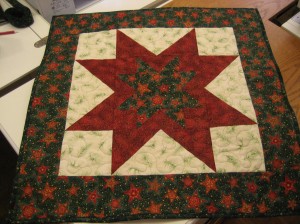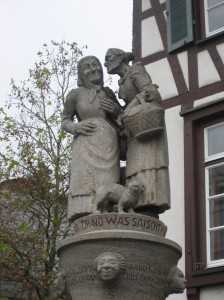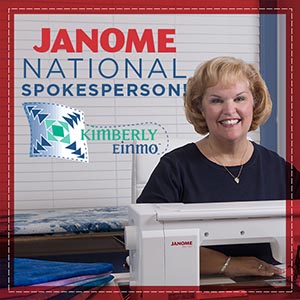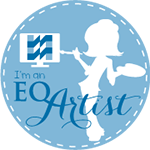I woke up quite excited this morning as today was the day I was to attend Frau Edelhoff’s Christmas breakfast for the ladies in the neighborhood. Since I have only met two other neighbors since moving here last June, I was eager to meet the other woman who call this street (and area around the little park) home.
 I folded the Star in a Star quilt I made last week for a hostess gift into a square, and tied it with a burgundy and gold braided cord I found in a box of ribbons and trims. Then I tucked in a Christmas card and a sprig of holly cut from my backyard under the bow. It looked very pretty (I should have remembered to take a picture to show you — darn!)
I folded the Star in a Star quilt I made last week for a hostess gift into a square, and tied it with a burgundy and gold braided cord I found in a box of ribbons and trims. Then I tucked in a Christmas card and a sprig of holly cut from my backyard under the bow. It looked very pretty (I should have remembered to take a picture to show you — darn!)
When I arrived at Frau Edelhoff’s haus, which is located just behind our house and down a gently sloping hill, the other ladies were either on their way into the house or had just arrived. There were ten ladies in all (myself included). Although twelve had been invited; sadly, two were unable to attend. Only Frau Edelhoff and one other lady, Christine, spoke any English at all. We exchanged smiles, and Christine made introductions to everyone on my behalf. There was a lot of pointing out the front living room window with exaggerated arm movements when trying to explain the location of the houses where each lady lives.
At this point Frau Edelhoff untied the bow and opened the folded quilt. The oohs and aahs sounded exactly the same in German as they do in English, and I could tell she was delighted to receive the quilt as a gift! All the ladies gathered around for a closer inspection and they began asking all sorts of questions (in German) while Christine worked very hard to translate so I could answer as quickly as possible. These ladies were familiar with quilts (patchwork) but were very eager to know all the typical things, such as “how long did it take… did I make it by hand or machine….do I make them for sale, etc.”
We took our seats around a large dining room table which was set very festively. I wish I had taken my camera with me — the table was so beautifully decorated! Frau Edelhoff used a dark brown tablecloth set with a full service of delicate pink rose colored dishes, which she explained came from France. There were burgundy candles lit on the table surrounded by gold and burnt orange Christmas decorations, pine boughs and red holly berries. Honestly, I would never have thought to put those unusual colors together, but everything looked absolutely enchanting! (I have made a mental note to use those colors together in a future quilt….)
Breakfast was lovely. One of the ladies, Frau Riehle, works for the local backerei and she provided all the delicious brot (bread), pretzels, and other pasteries fresh from the oven. There was a large selection of cold cuts, meats, cheeses, fruits, coffee and tea, accompanied by butter, local honey, and homemade preserves. After the first “course” was served, Frau Edelhoff brought out a lovely plate heaped with tasty Christmas cookies and biscuits — again made lovingly by Frau Riehle from the local backerei.
For much of the meal, I just smiled and listened. I would catch a word here or there I understood, but for the most part I couldn’t tell what they were talking and laughing about. Of course they were not being rude — and Christine and Frau Edelhoff did try to translate the “gist” of what was being said without taking up too much time making direct German-to-English translations. I didn’t mind in the least. I enjoyed watching their faces — seeing the expressions, and enjoying the fellowship that comes when there is a common bond.
There are some things I can say for sure:
-
A smile and laughter are universal in any language. You can speak to someone who may not understand a word you are saying; but if you do it warmly, graciously, and with sincerity, the feeling is clearly understood.
-
 Women are women. They share the same likes, interests, and frustrations no matter the nationality. Their eyes sparkle with mischievousness when they share a bit of gossip; the emotion and love in their voices can be felt when they speak of their husbands, children, or grandchildren; and they thoroughly enjoy sharing the latest news, information and exchanging recipes!
Women are women. They share the same likes, interests, and frustrations no matter the nationality. Their eyes sparkle with mischievousness when they share a bit of gossip; the emotion and love in their voices can be felt when they speak of their husbands, children, or grandchildren; and they thoroughly enjoy sharing the latest news, information and exchanging recipes! -
Quilts are universal. People are drawn to them whether they know anything about them, or perhaps have never even seen a quilt before. They instinctively want to touch and feel the fabric. Quilts make people smile.
-
Friendships and bonds can last through the years. All but one of the ladies have lived in this neighborhood for more than 20 years. Several have lived here all their lives. I learned my next door neighbor’s late wife was the sister of Frau Stohl, who also lives behind me. I learned many of them meet to play cards regularly and they enjoy having local block parties and various fests in the summer. And I learned that none of them care for the Serbian man who lives across the street and does nothing all day long but smoke cigarettes and drink beer!
I am very honored these lovely German ladies have invited me to join their group — despite the challenges of a language barrier — and have welcomed me with open arms “to the neighborhood.” I have a renewed commitment to try to learn their language in the coming months so when I see them on the street or in the village, I will be able to communicate and converse with them in their native language.
And who knows? Perhaps my little quilt — given in friendship as a hostess gift — might create a spark in one or more of these woman which might introduce them to the wonderful world of quilts!












From one Kimberly to another- you are so right- quilts, women, sharing, and laughing are a universal and a language all of their own. How wonderful is that!! I wonder if the hostess realizes the little gift of a quilt comes with a legacy all of its own. thanks for sharing your experience. it keeps what’s important upfront.
I have a book to recommend to one and all, a book that is related to this whole topic. It’s called “The Friday Night Knitting Club”, by Kate Jacobs. OK, it’s not about quilting, but it is about the threads that tie women together. Get a copy, curl up on a cold and snowy day with your favorite cat, sip a few cups of tea and read away. You might want to keep a few tissues handyI have substituted the word “quilting” for the word “knitting”:
“Quilting.
Does this skill have validity for the modern woman?
Yes.
There is tremendous power when women hold on to — or reclaim, in the case of many young women today — the traditional skills of women who went before us. In the developed world, quilting is at once a reminder and a connection to the struggles of our collective past, when warm clothing was a necessity that could only be made by hand, and a joyous celebration of the ingenuity and creativity of our mothers and grandmothers.”
Amen.
Ooops, something got deleted from a sentence prior to the quote. It should read: “Below is a quote from the very end of the book. I’ve substituted the word ‘quilting’ for the word ‘knitting’.”
Hey, Pat! Thanks for the book recommendation. Sounds like something I’ll definitely have to check out.
To Kimberly — thank you for your affirmation — I appreciate it more than you could know!